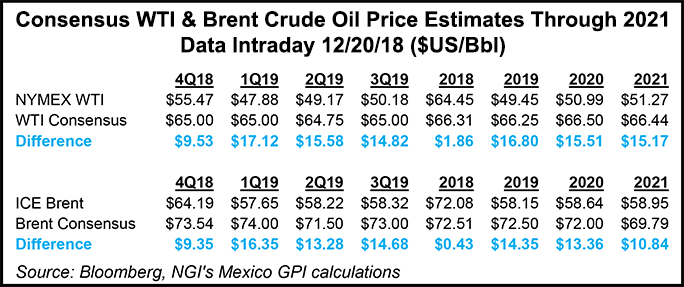Regulatory | NGI All News Access
Moody’s, Negative on Mexico, Sees Latin American Oil Industry Stable in 2019
Latin America’s oil and gas industry has a stable outlook for 2019, Moody’s Investors Services said in a new report, although the ratings agency warns of negative investment momentum in Mexico’s oil and gas based on the energy policy of the new government of Andrés Manuel López Obrador.

Moody’s cites the decision by López Obrador to halt oil auctions and postpone farmouts with the state oil company as a reason for the negative outlook. Mexico’s Comisión Nacional de Hidrocarburos (CNH) on Dec. 11 canceled onshore bid rounds 3.2 and 3.3. It also postponed for six months a farmout tender for stakes in acreage held by Petróleos Mexicanos (Pemex). López Obrador has said no rounds will be held for three years and that their continuation depends on how quickly projects awarded under previous tenders begin producing.
Moody’s also said that the new government’s focus on the refining segment, continued declines in oil and gas production and an unfavorable fuel price policy are reasons for caution on Mexico.
The change in Mexico’s energy agenda also raises cash flow and business risk at Pemex, Moody’s says. Refinancing risk increases in mid-to late 2019, with $7 billion of debt due in 2020. However, “very high implicit support from [the] Mexico government eases rising credit risk.”
López Obrador’s proposed 2019 national budget includes an increase of 18.5% for the Pemex budget, seeing it rise to 464.6 billion pesos ($23.1 billion). After almost 15 years of production declines, he has set ambitious targets to reach 2.4 million b/d of oil production by 2024, from 1.8 million b/d today. To do this, Pemex plans to focus upstream investment on shallow water and onshore conventional fields in the southeastern states of Veracruz, Tabasco and Campeche, as well as onshore conventional fields in northern Mexico. The company will also develop an $8 billion oil refinery in Tabasco.
On the positive side, reduced uncertainty around the United States-Mexico-Canada (USMCA) trade deal benefits Mexico, according to Moody’s. The agreement, which still requires approval of the U.S. Congress, allows for tax-free transport of raw and refined products across borders.
The outlook for oil and gas in the majority of the rest of Latin America is better, Moody’s says. The agency sees stable commodity prices and stable economic growth, along with continued cost discipline, as supporting companies’ cash generation.
“Despite unimpressive GDP growth, we expect softer oil and gas prices will keep EBITDA relatively stable in 2019,” says Moody’s Senior Vice President Nymia Almeida. “The rise in production for Brazil and Argentina more than offsets the declines in Mexico and Venezuela. Furthermore, lower or stable capital spending will help protect cash and reduce negative free cash flow.”
Like Mexico, Brazil voted into power a new president in 2019, conservative Jair Bolsonaro, but he has been supportive of the free market energy policies adopted by his predecessor Michel Temer. Continued intervention in fuel pricing at Petroel Brasileiro (Petrobras) however could hurt profitability, Moody’s said.
“In Colombia, solid economic growth at above 3% will support fuel demand and increasing efficiency will support production and reserve life.”
Meanwhile, Argentina goes to the polls in 2019 in what will be the most closely watched election of next year. The possibility of a loss at the polls for president Mauricio Macri raises economic and political risk on top of the current economic contraction, according to Moody’s.
The agency cites US-China trade tensions as having the potential to disrupt investment and revenue for globally integrated oil and gas companies in 2019. Oil prices consistently below $40/barrel could also impact the outlook for the region, the agency said.
© 2024 Natural Gas Intelligence. All rights reserved.
ISSN © 2577-9877 | ISSN © 2577-9966 |
